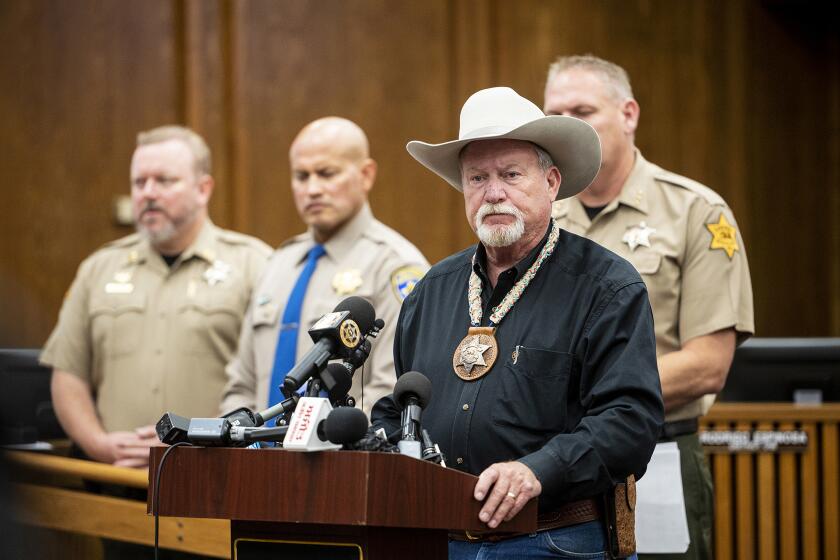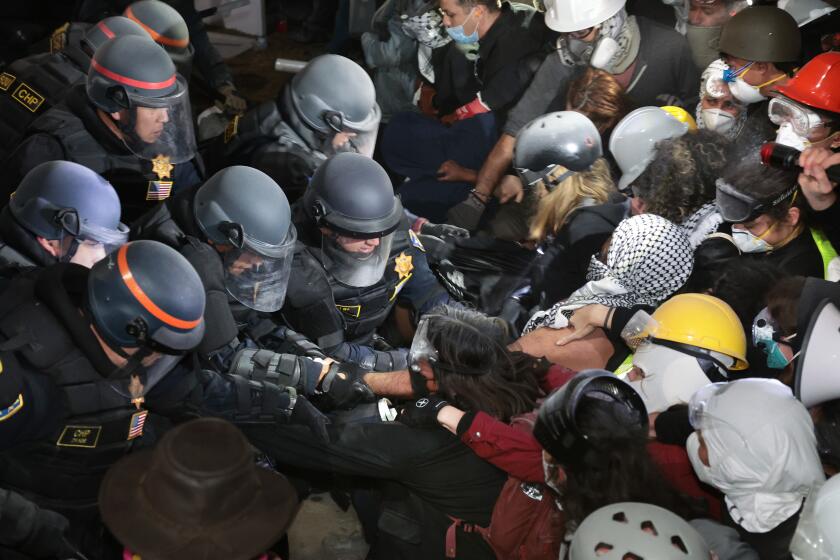Pellicano to get hearing on evidence
A federal judge on Monday agreed to hold an unusual evidentiary hearing to explore defense allegations of government misconduct in the wiretapping prosecution of private investigator Anthony Pellicano.
The decision by U.S. District Judge Dale S. Fischer was a rare victory for attorneys of the former private eye to the stars. Pellicano’s defense team has long argued that the FBI and federal prosecutors violated his constitutional rights by using his ex-girlfriend, Sandra Carradine, to elicit confidential information from him when he was in prison, without his attorney’s knowledge.
Although pretrial evidentiary hearings are not extraordinary, they do not often concern alleged violations of a defendant’s right to legal representation. And Pellicano’s lawyers had to document their claims sufficiently to warrant a full courtroom examination.
Pellicano’s attorneys, in court papers, alleged that Carradine visited Pellicano at least 27 times at a prison near Bakersfield where he was completing a sentence for illegal possession of explosives. Carradine’s goal, they contended, was to obtain incriminating information for use in his subsequent indictment on wiretapping, racketeering and other crimes. During that same period, they say, Carradine spoke 55 times with Stanley Ornellas, the lead FBI agent in the case. She later pleaded guilty to lying to a grand jury about hiring Pellicano to wiretap her ex-husband, actor Keith Carradine.
“The agent, the prosecutor and the informant are the core group,” attorney Steven Gruel said outside court. “And this ruling allows us to explore what we have maintained all along: that the government showed a disregard for Mr. Pellicano’s rights by sending Ms. Carradine in as a mole to find out what was going on in his defense camp.”
Authorities responded that the government did not put Carradine up to the visits or to calling Pellicano in prison. Her attorney supported the government’s version of the story.
The government also said that authorities did not think Pellicano had legal counsel at the time of the visits.
The judge said the hearing would help resolve whether Pellicano had a lawyer and if Carradine was acting as a “government agent,” or was simply passing on information to authorities when she was under scrutiny herself. In a statement released after Monday’s court session, the U.S. attorney’s office downplayed the significance of the ruling.
“The judge indicated that she agrees with us on the law, but she noted that there were conflicting facts with regard to the representation of Mr. Pellicano, which is why we believe she granted the evidentiary hearing,” spokesman Thom Mrozek said. “This means and proves nothing other than there are conflicts in the positions of the parties, something that happens quite often during the course of most lawsuits.”
However, two former federal prosecutors not involved in the case said the decision was bad news for the government.
“It is clearly a victory for the defense, regardless of whether their other motions are granted, because they will get to cross-examine witnesses, including the FBI case agent,” said David Willingham, who recently left the U.S. attorney’s office in Los Angeles and is now a defense attorney specializing in white collar crime.
Criminal-defense attorney Thomas Sleisenger agreed.
“This is a win for the defense and not good for the government,” he said. “Now they have to drag witnesses into court on something they didn’t think was an issue.”
--
More to Read
Start your day right
Sign up for Essential California for news, features and recommendations from the L.A. Times and beyond in your inbox six days a week.
You may occasionally receive promotional content from the Los Angeles Times.






